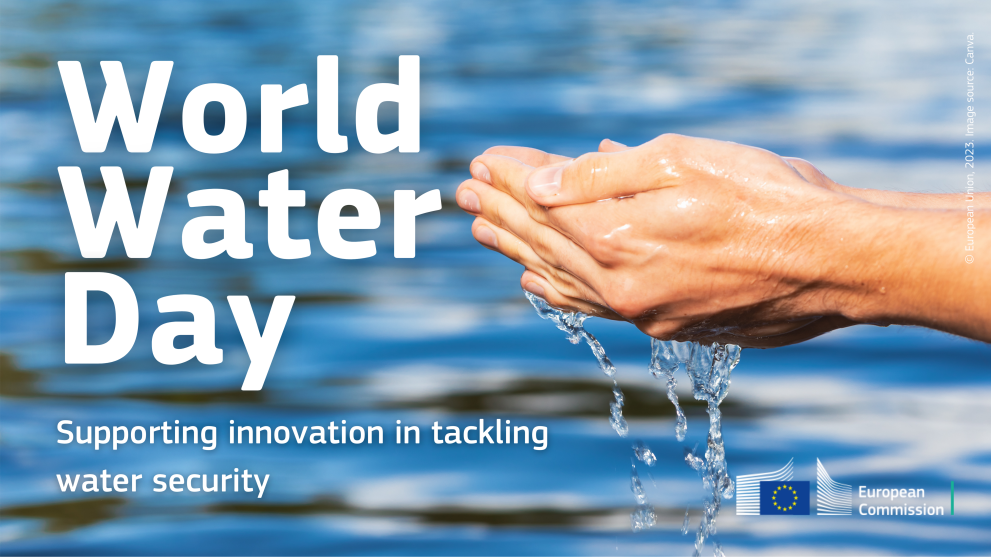
Dry riverbeds in France and Germany, shallow water levels in lakes in Italy and a lack of rain fall for vegetable crops in Spain all in the month of March 2023 alone; after its driest summer in more than 500 years, much of Europe is still in the grip of a winter drought. This has pushed EU governments to heighten concerns over water security for citizens and businesses across the continent.
According to the Organization for Economic Co-operation and Development (OECD), 60% of the global population could face water issues by 2050, with low-income families bearing the brunt of the water crisis. In some areas, water scarcity could dent economic growth by as much as 6% of GDP.
For World Water Day 2023, the European Commission stands in solidarity with the UN’s observance on accelerating change to solve the ever-pressing water scarcity and sanitation crisis. The global campaign, called ‘Be The Change’, encourages people to take action in their own lives to change the way they use, consume and manage water.
The European Commission recognises water scarcity and drought as a priority in the European Green Deal and is reflected in several major European strategies such as the 2021 EU Strategy on Adaptation to Climate Change, the 2020 Circular Economy Action Plan and the Biodiversity Strategy for 2030. The first EU policy on water scarcity and droughts was defined by the 2007 Communication ‘Addressing the challenge of water scarcity and droughts in the European Union’, reviewed in 2012 as part of the Blueprint for Safeguarding European Waters.
The European Commission also prioritises water security via the Mission ‘Restore our Oceans and Waters’. With a 2030 target, this Mission helps achieve the marine and freshwater targets of the European Green Deal, such as protecting 30% of the EU’s sea area and restoring marine eco-systems and 25.000 km of free-flowing rivers.
Below, you will find some of the latest Horizon 2020 projects funded by the European Commission and managed by the European Research Executive Agency (REA), to help spear innovation in tackling water security.
ICT4WATER: Digitalisation through the ICT4WATER cluster to boost innovation in the water sector
Water is key for society and for the economy. Digital solutions can play a vital role in addressing some of these challenges. A CORDIS results pack highlights 12 projects funded under the Horizon 2020 programme and showcases their innovative ICT solutions. These solutions include applying low-cost sensors, Big Data analytics, applications for consumers and novel approaches to identify leaks and reduce water loss and improve forecasting of water demand. This cluster supports the digital transformation as a critical enabler for attaining the sustainability goals of the European Green Deal by contributing to the EU’s climate ambition and the zero-pollution ambition.
Network Nature: shifting the water paradigm through nature
Healthy and functioning ecosystems are vital for water security as they ensure the delivery of water-related and water-dependant ecosystem services. The project uses Nature-Based Solutions (NBS) to support efficient management of water resources, conservation and security. Examples of successful ecosystem management can be seen in the City of Zurich. It has reduced wastewater treatment costs by removing stream flows from sewer networks, with each litre per second of diverted river flows generating annual savings in treatment costs of around 5,000 CHF.
InventWater: Inventive forecasting tools for adapting water quality management to a new climate
Long-term climate change, extreme events, and seasonal variations in weather have profound impacts on the water quality of rivers, lakes, and reservoirs. The InventWater project uses tools to anticipate the impacts of these environmental changes and enables effective water management that safeguards the ecosystem of goods and services freshwaters provide.
LIMNOPLAST: Sources and solutions for freshwater microplastics
Microplastics pose a major global threat but are generally poorly understood. Plastic enters fresh water sources inland, but almost nothing is known about how and where this occurs. This prevents authorities from managing or mitigating the problem at its source. The EU-funded LimnoPlast project is addressing this issue with a four-pronged approach: data assessment, training, technological solutions and behaviour change. The project will analyse the sources and impacts of freshwater microplastics, and train scientists at the source of the microplastics issue. The goal is to develop innovative solutions to remove microplastics from the environment and find environmentally-friendly replacements, such as organic or biodegradable polymers made from orange peels.
IoT4Win’s: Internet of Thing for Smart Water Innovative Networks
IoT4Win’s main objective is to tackle widespread scepticism shown by water utility companies regarding the use of ICT/IoT by aspiring to become a test case for future smart water system developments. To this end, the project has created an open, secure and resilient platform capable of working within an IoT environment or in conjunction with current water infrastructure.
Conclusion:
Water is the elixir of life. Wherever there is water, life can sustain itself, which is why it is so important to safeguard clean sources of water wherever they may flourish in Europe and beyond.
Details
- Publication date
- 21 March 2023
- Author
- European Research Executive Agency
